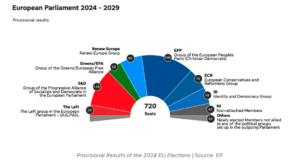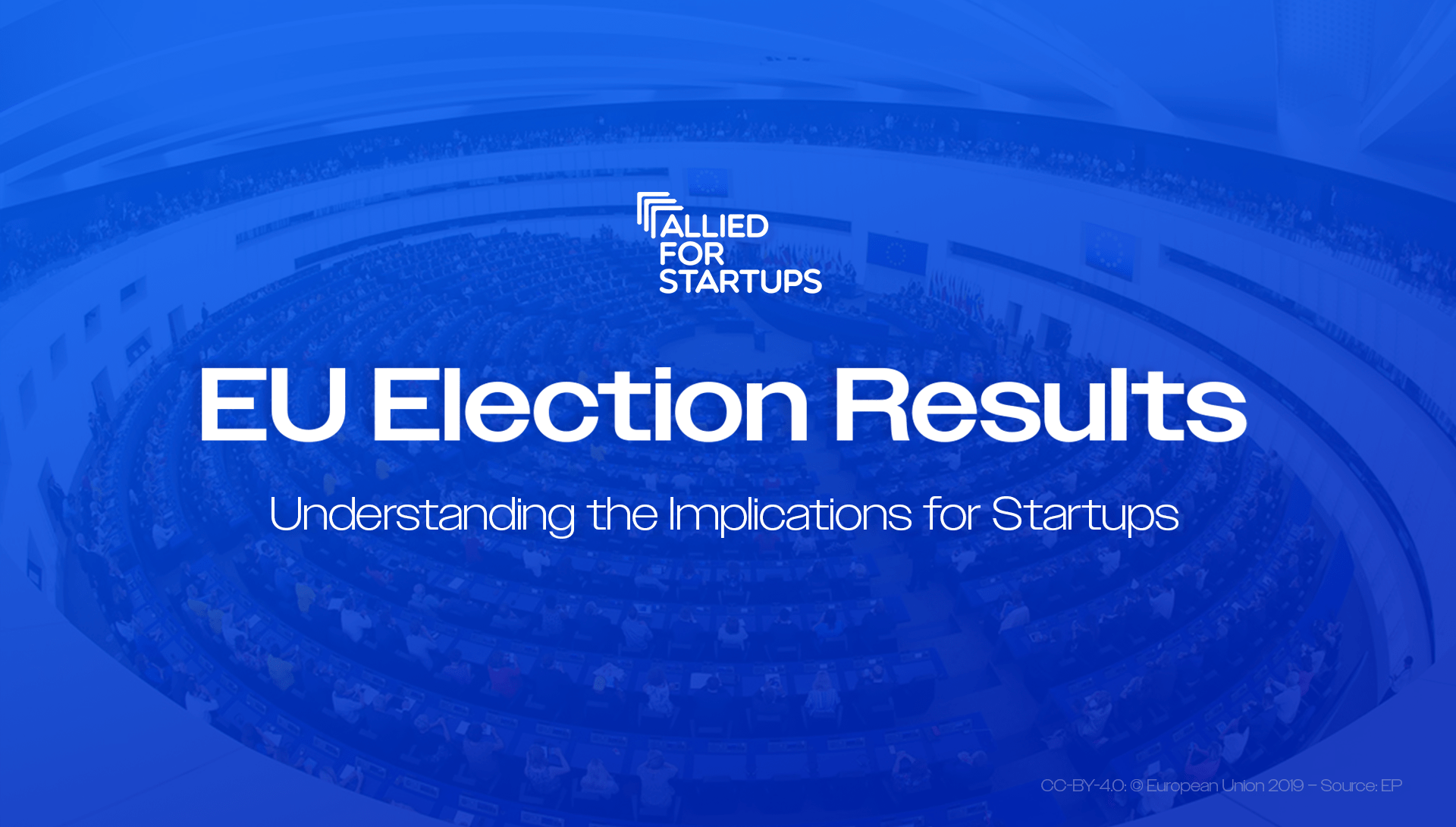EU Election Results and Their Implications for Startups
With the EU Elections in the rearview mirror, it is time to dive into the results to see what the new European Parliament composition will look like, the influence of the elections on the European Commission, and the implications on startups. Now as the EU embarks on another five year term, consider this your guide to understanding the direction in which this train is headed.
European Parliament shifts right, but less than anticipated
Ahead of the European elections, a considerable right-wing shift was expected, and although the Eurocritical and Eurosceptic groups have won seats, they did not grow as much as many polls predicted. The Eurocritical right-wing European Reformists and Conservatives (ECR) went from 9.78% to 10.14%, securing 73 seats, while the populist Eurosceptic Identity and Democracy group (ID) increased its representation from 6.95% to 8.06%, now holding 58 seats. Despite the right-wing turn being less sharp than expected, these two groups will now control 131 out of 720 seats in the European Parliament. This number, however, does not include the 15 seats of the German AFD, who were removed from the ID group days before the elections, the 10 seats of Hungarian Prime-Minister Orban’s Fidesz party, six seats of the Confederation Party from Poland, and three seats held by the Bulgarian Revival Party, as these parties are currently not allied with any political group in the European Parliament.
While the right emerged as the winner of the elections, the Greens and the Liberals lost a considerable number of seats, mainly to the centre-right Christian Democrats (EPP) which retains its position as the largest group in the European Parliament. As the Socialists & Democrats (S&D) remain the second largest group, the current coalition of EPP and S&D together with the Liberals (Renew) will likely be continued as they still hold a majority of 55.97%.

Moreover, the European pirate parties, a movement having tech and digital policies at the core of its platform, suffered considerable losses. Nevertheless, a large number of MEPs who have been active on tech and digital policies will return for another term, which is promising news for tech startups.
All in all, the result will mean a fairly similar Parliament composition to the previous one. It will lean slightly more to the right, as the coalition might have to look at the ECR in cases where voting cohesion within their own ranks is lacking and requires them to find partners outside the coalition to ensure a majority. Nevertheless, the power base remains the same and the EPP, S&D and Renew will most likely continue their coalition.
What does this mean for the European Commission?
As the EPP remains the largest group in the European Parliament, EPP lead candidate Ursula von der Leyen will be put forward as the first candidate for the post of European Commission President and is likely to be reappointed. The results of the EU elections and the pending continuation of the grand coalition of EPP, S&D and Renew in the Parliament means that this coalition can form a majority to vote in favour of her reappointment. The largest hurdle for von der Leyen, thus, will be to get the approval of the Member States, as required before the European Parliament can approve the appointment. Considering the right surge in countries such as France, von der Leyen might face greater difficulty in securing said support, although it is still expected that enough Member States will endorse her for a second term as Commission President.
The EPP’s election victory also means that the Christian Democrats are likely to introduce the new post of Defence Commissioner. As this new Commissioner will have dual-use technologies in their portfolio, this will be something to keep an eye out on for startups.
What do the election results mean for startups?
Talking about startups, what do the election results mean for smaller players? First of all, the European policy agenda will shift focus from emphasis on green and sustainability policies that were part of the European Green Deal in the previous legislative term, to an emphasis on European competitiveness and (economic) security. This shift will bring forward a focus on industrial policy and the ‘re-industrialisation’ of Europe to improve the EU’s competitive position vis-a-vis third countries and to enhance the EU’s security. Accordingly, increased interest and importance will be placed on innovation in the realm of dual-use technologies, which is a development to monitor for startups operating in fields like AI and quantum, among others.
Moreover, if we take a closer look at the manifestos of the three expected coalition parties -EPP, S&D and Renew – we see that this alliance has similar interests that could benefit startups. All three parties aim to address the regulatory burden for small businesses, which could shield startups from being impacted by the need to report obligations introduced through new regulations. This could be done, for instance, by insisting to assess the implications that new legislations have on startups. Furthermore, the coalition partners highlight the importance of facilitating access to funding and loans for startups. In addition, both the EPP and Renew believe that an open trade policy would ensure prosperity and sustainability in the EU, consequently benefiting startups. The parties state that this would open more opportunities to startups and diversify their source of workforce, finance and customers.
Generally, the continuation of this coalition means a continuation of a pro-EU coalition that is determined to strengthen the European Single Market and favours innovation. Overall, as we foresee a continuation of the grand coalition of EPP, S&D and Renew in the European Parliament, we are hopeful for a startup-friendly legislative environment in the EU in the upcoming mandate.

